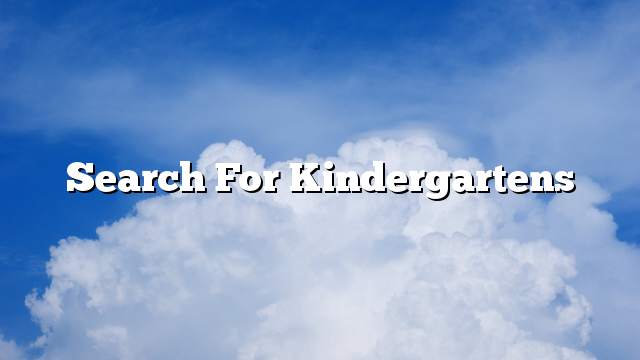Kindergarten
Is an educational institution that represents an early stage of teaching children before entering school. The term is widely used to describe all institutions that work with children between the ages of two and seven years. In most countries, enrollment in those institutions is for children under six years of age between three and five years.
The kindergarten has many pros and cons that make parents puzzled by the decision to enroll their children in kindergarten. Although the child has a personal space and time to move away from the mother’s delusion and start building an independent personality, many negatives appear in the lack of obedience to the mother, violence and indifference to Along with other children.
Basic kindergarten objectives
- Teach the child to communicate and interact with children of his age by playing.
- Helping children who spend most of their time at home adapting to keeping away from their parents and overcoming the fear and anxiety associated with the move.
- Provide tools and activities that motivate the child to learn useful skills such as reading, math, music, and social behaviors.
- Allow a safe place for children if parents are busy working.
Kindergarten Teachers
Working in kindergarten is very difficult and important to the degree that requires special qualifications in the teachers who supervise the education of children at that stage, and parents should also be aware of those qualifications and characteristics for the good choice of their children, and follow the most important qualities and qualifications Which should be enjoyed by a kindergarten teacher.
Physical characteristics
- The kindergarten teacher must have a correct structure free of serious defects and illnesses, such as inability to move a limb, severe visual impairment or speech defects
- Be physically correct in terms of the vitality and strength that helps her to make an effort. In other words, she has a high physical fitness that enables her to deal with children in different situations, no matter how much muscle work is required.
- Enjoy a well-groomed and attractive look for children to provide psychosocial support and follow healthy habits in dealing with children.
Mental and emotional skills
- There must be a range of mental skills, the most important of which is sharp intelligence and intuitive speed to deal with sudden situations, accuracy of observation and ability to innovate with a broad imagination and knowledge of various types of science and arts to teach children more generally and the creation of educational tales.
- The ability to organize time, especially leisure, and enjoy an aesthetic sense and fertile imagination to find activities for children.
- Being child-loving is patient, compassionate and able to take responsibility, with a high degree of emotional stability when dealing with them without cost or neglect, to help satisfy the child’s emotional and mental needs to the fullest, which he needs at that stage.
